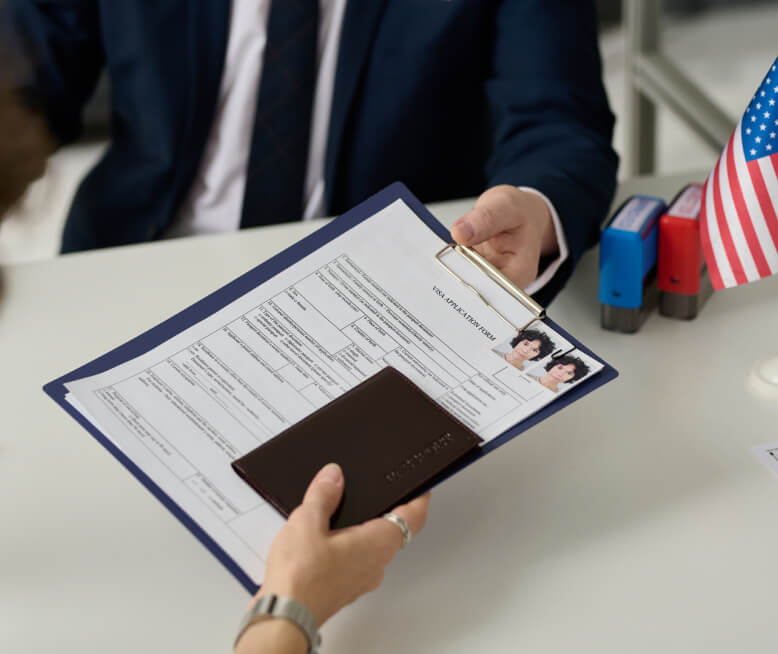Paths to U.S. Citizenship
There are several paths to acquiring U.S. citizenship, each with its own requirements and processes:
Citizenship by Birth
Individuals born in the United States or certain U.S. territories generally acquire U.S. citizenship at birth automatically, regardless of their parent’s citizenship or immigration status.
Citizenship through Parents (and sometimes Grandparents) – Acquisition or Derivation
Some individuals born outside the U.S. may acquire or derive U.S. citizenship through their U.S. citizen parents in different scenarios, including:
- Birth abroad to a U.S. citizen parent
- Naturalization of parent
- Residing in the U.S. as a green card holder in the custody of a U.S. citizen parent
Eligibility can depend on factors such as how much time the U.S. citizen parent (or sometimes grandparent) has spent in the U.S., the laws in effect at the time of the child’s birth, and others.
Naturalization
Naturalization is the process by which lawful permanent residents (green card holders) apply to become U.S. citizens.
To be eligible for naturalization, applicants generally must:
- Be at least 18 years old
- Have been a lawful permanent resident for at least 5 years (or 3 years if married to a U.S. citizen)
- Meet continuous residence and physical presence requirements
- Demonstrate good moral character
- Pass English and civics tests (with certain exceptions)
- Take the Oath of Allegiance
Some eligibility requirements are waived or reduced for members of the armed services.
The Naturalization Process
Our citizenship and naturalization lawyers will guide you through each step of the naturalization process:
- Eligibility assessment: We’ll review your immigration history and current status to determine your eligibility for naturalization and identify any potential challenges.
- Application preparation: We’ll help you gather the necessary documents and prepare a comprehensive application package, including Form N-400, Application for Naturalization.
- Biometrics appointment: After filing your application, you’ll attend a biometrics appointment to provide fingerprints, photos, and a signature for background checks.
- Citizenship interview: You’ll attend an interview with a USCIS officer, who will review your application and test your English language abilities and knowledge of U.S. civics if required. We will thoroughly prepare you for the interview and are available to accompany you as well.
- Oath of Allegiance: If your application is approved, you’ll attend a ceremony to take the Oath of Allegiance and officially become a U.S. citizen.
With proper preparation and guidance, naturalization can be a straightforward process. Our attorneys ensure you understand each step and are fully prepared when you walk into your USCIS interview. Contact us to assess your eligibility for U.S. citizenship.
Overcoming Naturalization Delays Through Litigation
When USCIS fails to process naturalization applications within reasonable timeframes, federal court action may be necessary. Our attorneys have extensive experience filing lawsuits to compel USCIS to act on delayed naturalization cases. Through these federal court actions, we can:
- Force USCIS to make a decision on long-pending applications
- Get clarity on the reasons behind processing delays
- Set concrete timelines for application adjudication
- Hold USCIS accountable to statutory processing requirements
While we also assist with standard delay remedies like case status inquiries and expedited requests, litigation is often the most effective tool for resolving serious processing delays. When months or years of waiting have produced no results, a federal lawsuit can finally break through the bureaucratic roadblocks.
Our team will evaluate your case to determine if litigation is appropriate and guide you through the entire federal court process. Don’t let USCIS delays indefinitely postpone citizenship. Contact us to discuss legal options for resolving your delayed naturalization case.
Why Choose De Wit Immigration Law
When you work with De Wit Immigration Law for your citizenship and naturalization needs, you’ll benefit from:
- Personalized attention: We take the time to understand your unique circumstances and goals, providing tailored guidance throughout the naturalization process.
- Comprehensive service: From eligibility assessment to oath ceremony, we’ll be with you every step of the way, providing proactive updates and addressing any challenges that arise.
- Experience: Our attorneys have deep knowledge of citizenship and naturalization law and stay current on the latest policy changes and processing trends.
- Advocacy: We’re passionate about helping clients achieve their dreams of U.S. citizenship and will advocate fiercely on your behalf to overcome delays and obstacles.
Don’t let the naturalization process or the frustrations of delays stand between you and your goal of becoming a U.S. citizen. Contact De Wit Immigration Law today to schedule a consultation with one of our experienced citizenship and naturalization lawyers. We’re here to help you navigate the path to U.S. citizenship with confidence.
Here’s a strategic FAQ section for the Citizenship & Naturalization page:
Frequently Asked Questions
U.S. citizenship offers several benefits, including:
- The right to vote
- Protection from removal
- Eligibility for federal jobs
- Access to additional government benefits
- The ability to petition for parents and siblings
- The ability to apply for a U.S. passport
USCIS processing times vary by location. Currently, most applications take less than one year from filing to oath ceremony, though some cases may take longer depending on complexity and local office workload.
You generally must be at least 18 years old, have been a permanent resident for 5 years (3 years if married to a U.S. citizen), demonstrate continuous residence and physical presence in the U.S., show good moral character, pass English and civics tests, and take the Oath of Allegiance.
Yes, but travel should be limited and documented. Extended absences can disrupt the continuous residence requirement and delay your case. Consult with us before planning any international travel during the naturalization process.
Some offenses may not prevent naturalization, while others are a hard stop. But any criminal history requires careful attention. Our attorneys will evaluate your record to determine eligibility and develop appropriate strategies for addressing past incidents in your application.
If you fail either the English or civics test, USCIS will schedule a second interview within 60-90 days. You only need to retake the portion you failed. We give our clients resources to thoroughly prepare for both initial and retake examinations.
Certain exceptions allow for earlier applications, most commonly for spouses of U.S. citizens (3 years) and certain military service members. We can evaluate whether you qualify for any early filing provisions.
Contact us to discuss your path to U.S. citizenship and get answers to any other questions about the naturalization process.
Whether you are a foreign investor or entrepreneur, a U.S. employer of any size, or an individual seeking to immigrate based on your talent or a close family relationship, we offer straightforward immigration strategies to advance your personal and professional goals.

-
I’m an Entrepreneur
-
I’m an Employer
-
I’m an Individual

I am extremely satisfied with the professional services provided by Jose and his team. Their profound knowledge of immigration law, coupled with exceptional customer service, ensured all my doubts and questions were promptly addressed. Highly recommended.



